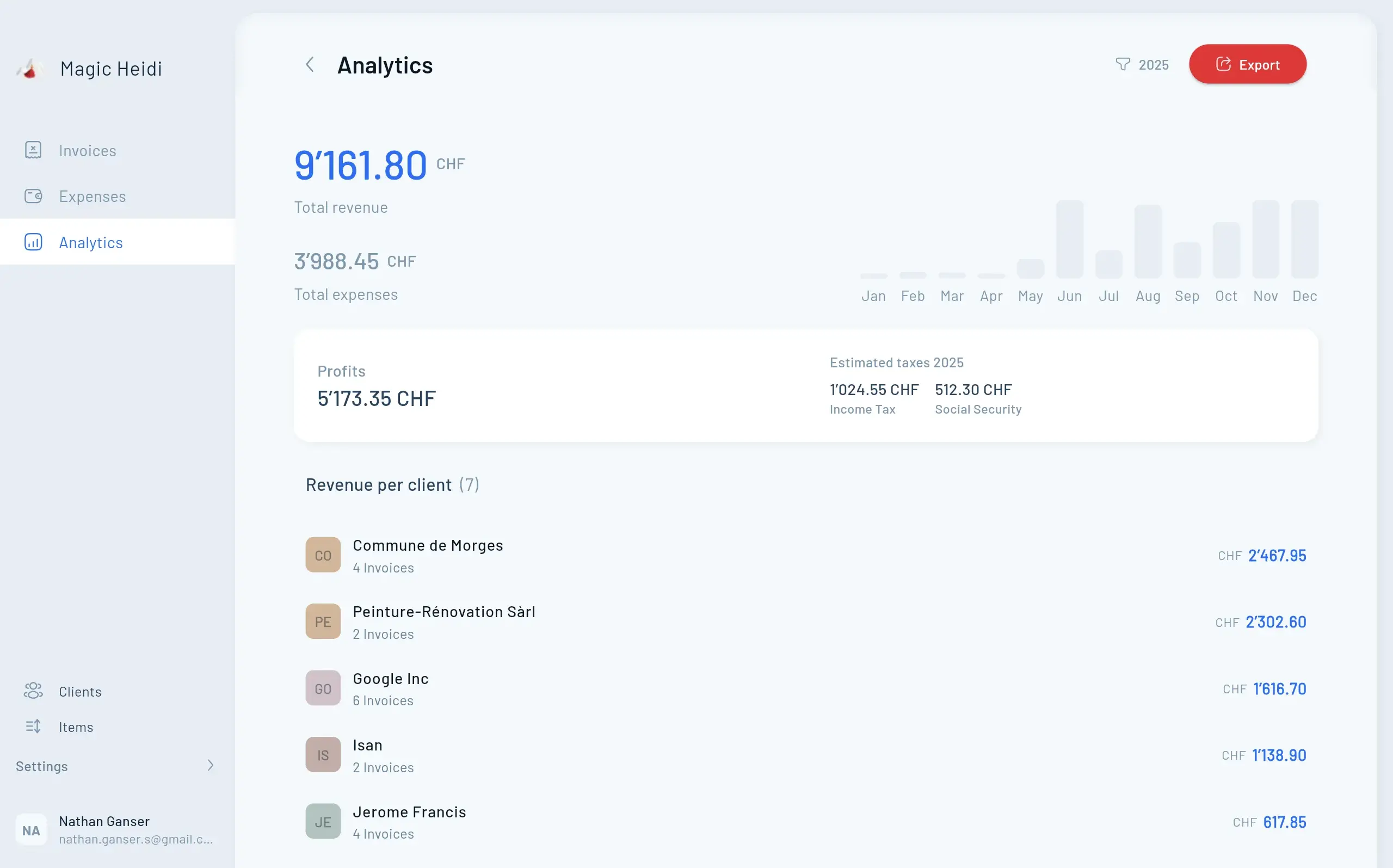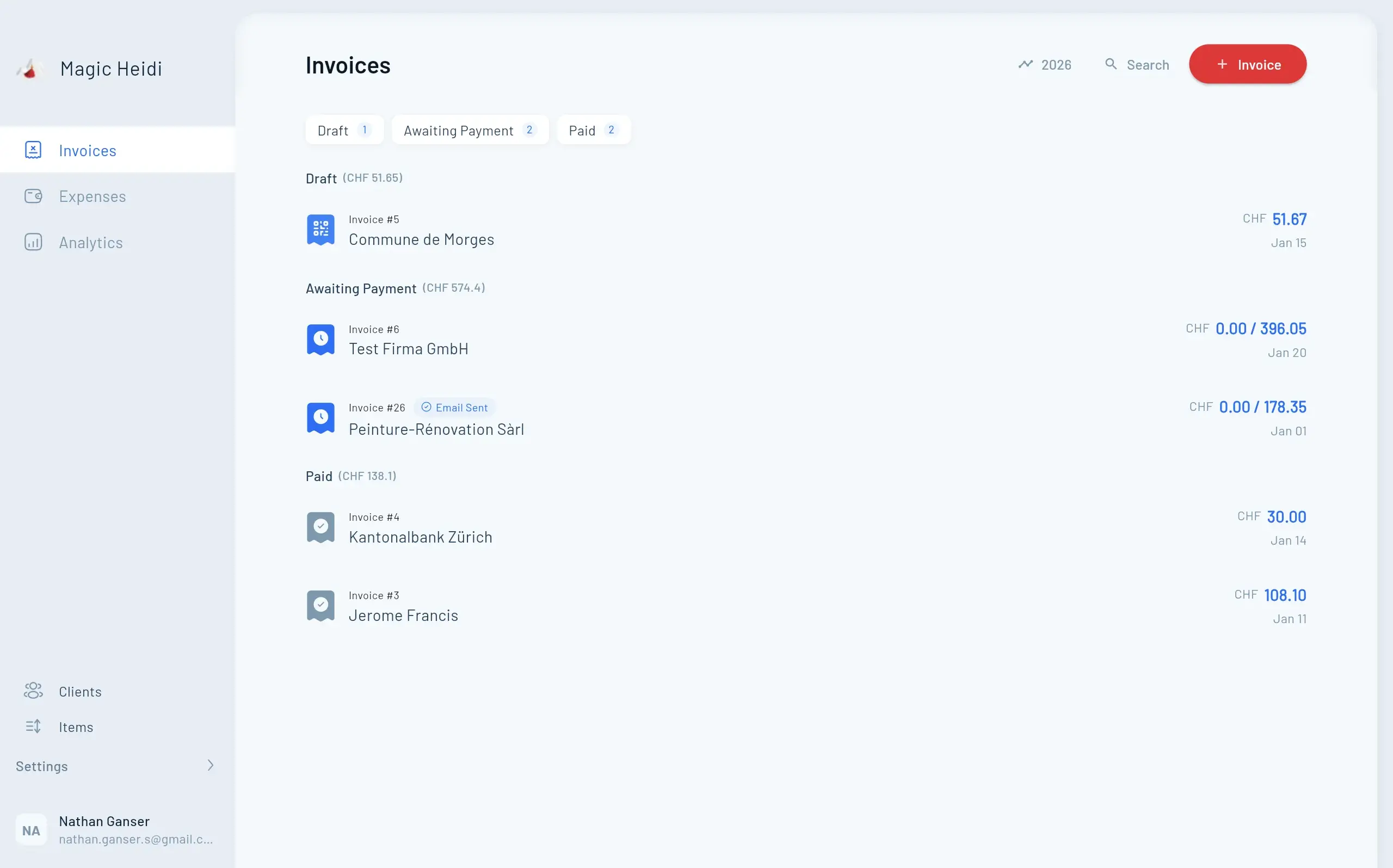Buchhaltung in der Schweiz—simple bookkeeping
for freelancers (and small businesses)
A practical Swiss-first guide: what to track (invoices, receipts, VAT/MWST), common costs (DIY vs. Treuhänder), and how Magic Heidi keeps it simple with QR invoicing, CHF, Swiss VAT readiness, and clean exports.

If you’re self-employed in Switzerland, bookkeeping can feel like a mix of Milchbüechli, admin overload, and “I’ll ask a Treuhänder later.” The good news: for many freelancers and micro-businesses, Swiss bookkeeping can be straightforward—when you have a clear workflow and Swiss-ready tools (QR invoices, CHF, VAT/MWST rates, and clean exports).
This guide explains how bookkeeping in Switzerland works, what you should track, what it typically costs (DIY vs. trustee), and how Magic Heidi helps you handle Buchhaltung Schweiz in a simple, modern way—without switching to an enterprise suite before you need it.
Note: This page provides general information, not legal or tax advice. Requirements can vary by legal form, turnover, and VAT status.
Swiss bookkeeping feels messy—until your workflow is clear.
Many freelancers start with spreadsheets, folders, and “I’ll sort it later.” The real goal is a simple routine: QR invoices, receipts captured as you go, VAT-ready tracking when needed, and clean exports for your Treuhänder.
Invoices + payments
Create QR invoices and track paid/overdue.Receipts + supplier bills
Capture and attach documents right away.VAT/MWST readiness
Track VAT consistently (if registered).Buchhaltung Schweiz in plain terms
In Switzerland, bookkeeping is your system for documenting business activity clearly enough to understand results—and support tax and VAT reporting when required.
- 💸Income tracking
Invoices, payment status, and matching payments.
- 🧾Expense tracking
Receipts, supplier invoices, and categories.
- 🗂️Record storage
Organized, retrievable documents for trustee/tax/VAT.
- 🧮VAT/MWST (if registered)
VAT on sales/purchases + reporting-ready totals.
- Invoice #3
Magic Heidi
CHF 500
Jan 29
- Invoice #2
Webbiger LTD
CHF 2000
Jan 24
- Invoice #1
John Doe
CHF 600
Jan 20
Create invoices the Swiss way with QR-Rechnung
Swiss customers expect QR-bills. Using QR invoicing by default reduces payment friction and avoids manual formatting work.

Capture expenses as you go—no shoebox
Scan or photograph receipts, categorize them, and keep documents attached to transactions. With OCR/AI-style workflows, you spend less time typing and more time working.

Do you need double-entry bookkeeping in Switzerland?
It depends on your legal form, size, and obligations.
Simple bookkeeping (income/expense ledger)
Many self-employed people start with a straightforward system: track income, expenses, and keep receipts. This can be enough for small operations—especially early on.
Double-entry bookkeeping
As you grow (or if your business structure/requirements demand it), double-entry bookkeeping becomes relevant because it provides:
- A full balance sheet view (assets, liabilities)
- Cleaner year-end closing workflows
- More robust reporting and control
Practical takeaway: Start with a tool that matches your current needs and doesn’t block you from collaborating with a trustee later.
A simple Swiss bookkeeping workflow (that actually works)
If you want bookkeeping to stay under control, aim for a repeatable weekly/monthly routine:
Step 1: Create invoices the Swiss way (QR-bill)
Use a system that supports QR invoices and CHF by default. This reduces payment friction and avoids manual formatting.
Step 2: Capture expenses as you go
Instead of collecting receipts in a shoe box:
- Scan or photograph receipts
- Assign categories
- Attach documents to transactions
Modern tools increasingly include OCR/AI-style scanning so you spend less time typing.
Step 3: Keep VAT in mind (if applicable)
If you’re VAT-registered:
- Record whether each invoice/expense includes VAT
- Track VAT totals consistently throughout the year (not just at filing time)
Step 4: Reconcile and review monthly
Once a month:
- Check unpaid invoices
- Review expense categories
- Make sure documents are attached
Step 5: Export for your trustee (Treuhänder) when needed
At quarter-end or year-end, export your data so your trustee can:
- Validate your books
- Prepare financial statements (where applicable)
- Support tax and VAT filing
DIY, outsource, or hybrid?
The 3 common approaches in Switzerland
Most Swiss freelancers pick one of these models depending on time, complexity, and budget.
DIY bookkeeping with software
Best if you want maximum control and lower ongoing cost.
- Simple operations (service-based work)
- Quick invoicing + easy receipt tracking
- You want to understand your numbers
- Lower direct monthly cost
Fully outsourced bookkeeping (Treuhand)
Best if you want minimal admin and are happy to pay for time saved.
- Many transactions
- Payroll needs
- Frequent VAT support
- You focus purely on delivery/sales
Hybrid (DIY + trustee support)
What does bookkeeping cost in Switzerland?
Costs vary widely—but Swiss buyers expect transparency. Here’s a realistic overview.
1) Accounting software costs (typical ranges)
Swiss bookkeeping software is often priced as a monthly subscription. Expect roughly:
- Entry-level / single-user tools: ~CHF 10–30/month
- All-in-one SME suites: often higher, depending on modules/users
- Desktop subscriptions: sometimes billed annually (e.g., CHF/year plans)
The key is not just price—it’s fit: QR billing, Swiss VAT support, export for trustee, and ease of use.
2) Treuhänder / fiduciary bookkeeping costs (typical ranges)
Trustee pricing is usually:
- Hourly, often roughly CHF 95–180+ per hour depending on region and seniority
- Monthly packages, often based on:
- number of bookings/transactions
- VAT filing frequency
- payroll headcount
- year-end closing complexity
Some firms publicly announce rate adjustments (including changes effective in 2026), which is a reminder to budget for gradual increases over time.
3) What drives your total cost the most
Whether you DIY or outsource, these factors typically drive cost:
- Number of invoices + expense receipts per month
- VAT registration and reporting complexity
- Payroll (employees, AHV/AVS-related processes, etc.)
- How organized your documents are (messy inputs cost money)
If you want lower trustee costs: use software to keep receipts clean, categorized, and attached—so your trustee reviews instead of reconstructs.
What to look for in a
Swiss bookkeeping tool
When searching “Buchhaltungssoftware Schweiz”, prioritize Swiss essentials (QR, CHF, MWST) plus usability that you’ll actually stick with—and exports that make your Treuhänder happy.
QR invoices are the Swiss default for getting paid.
Defaults should match how you operate in Switzerland.
Rates and outputs that support VAT reporting when you register.
Share clean data for review, VAT checks, and year-end.
Magic Heidi: simple bookkeeping in Switzerland—built for freelancers
Magic Heidi is designed for Swiss freelancers and self-employed people who want simple day-to-day admin now, while staying ready for growth later: QR invoicing, expense capture, MWST-ready tracking, and clean exports for your Treuhänder.

Why Magic Heidi fits “Buchhaltung Schweiz” intent
You get a practical, Swiss-first setup for day-to-day admin:
- Invoice fast (including Swiss QR invoices)
Create professional invoices that match how Swiss customers pay. - Track income and expenses without heavy accounting complexity
Keep a clear overview of what’s coming in and what’s going out—without building an enterprise finance department. - Swiss VAT/MWST support
Stay organized for VAT reporting with Swiss-ready handling (especially important once you register). - Expense scanning and automation
Use scanning/OCR-style workflows so receipts don’t pile up. - Work across devices
Built for modern work: handle tasks on web/desktop/mobile depending on your routine. - Collaborate with your trustee (Treuhänder)
Keep your data exportable and reviewable—so you can DIY day-to-day and still get professional help when it matters. - Swiss hosting + multilingual support
Switzerland runs on trust. Having Swiss context and support (including French for Romandie) matters.
Who Magic Heidi is best for (and when you might want something else)
Magic Heidi is ideal if you are…
- A freelancer / independent professional (Einzelfirma, Einzelunternehmer)
- A micro-business that wants QR invoicing + simple bookkeeping
- Someone who wants to start DIY and optionally bring in a trustee later
- Switching from spreadsheets or a tool that’s too complex for your needs
You might prefer a heavier suite if you…
- Need deep inventory/warehousing workflows
- Have complex multi-entity structures
- Require advanced enterprise approvals and custom accounting processes
Many businesses start simple and only upgrade complexity once operations demand it.
Pricing: keep it predictable
Swiss founders are price-sensitive—and Swiss SaaS pricing changes do happen across the market. That’s why predictable, transparent pricing is a key decision factor.
Magic Heidi is positioned as a straightforward subscription (monthly or annual), so you can budget confidently and avoid paying for modules you don’t need.
Next step: choose a plan, set up QR invoicing, and build a monthly routine you can keep.
Call to action: start your Swiss bookkeeping setup now
If your goal is to stop worrying about admin and get a clean system in place:
- Create your first QR invoice
- Capture expenses with scanning
- Stay ready for VAT/MWST
- Export cleanly for your Treuhänder
Start with Magic Heidi and turn “Buchhaltung Schweiz” into a simple monthly routine.
CTA: Try Magic Heidi now and set up invoicing + bookkeeping in under an hour.
FAQ: Buchhaltung Schweiz / comptabilité Suisse
Do I need bookkeeping as a freelancer in Switzerland?
Yes. Even with a small operation, you should document income and expenses and keep receipts. The level of formality depends on your legal form, size, and obligations.
What is the difference between “Buchhaltung” and “Rechnungsstellung”?
Rechnungsstellung (invoicing) is creating and sending invoices. Buchhaltung (bookkeeping) includes invoicing plus expense tracking, receipt storage, payment tracking, and (if applicable) VAT/MWST preparation and exports for year-end.
Can I do my bookkeeping myself and use a trustee only for year-end?
Yes—this is a common hybrid approach in Switzerland. Use software to keep invoices and receipts organized, then export and collaborate with your Treuhänder for review and year-end closing.
How long do I need to keep receipts and accounting records in Switzerland?
Retention rules depend on context and applicable requirements. As a best practice, keep receipts and accounting records organized and accessible long-term. If in doubt, ask your trustee for guidance based on your situation.
What is a “booking” (Buchung) in trustee pricing?
A “booking” typically means one recorded transaction/entry—like an invoice, an expense, a bank movement, or a journal entry. Package pricing often scales with the number of monthly bookings.
Do I need VAT (MWST/TVA) bookkeeping if I’m not VAT-registered?
You still need bookkeeping (income, expenses, receipts). VAT-specific tracking becomes essential once you register for MWST/TVA.
Does Magic Heidi support Swiss QR invoices (QR-Rechnung / facture QR)?
Yes—QR invoicing is a core Swiss requirement and is central to modern invoicing and payment workflows in Switzerland.
Is Magic Heidi suitable for “comptabilité Suisse” (Romandie)?
Yes. Switzerland is multilingual, and Magic Heidi supports multilingual usage and Swiss-based context—helpful for French-speaking users in Romandie searching for comptabilité Suisse or logiciel de comptabilité Suisse.
{ "What’s cheaper": "software or outsourcing bookkeeping?", "answer": "Software is usually cheaper in direct monthly cost. Outsourcing can save time but is priced hourly or in packages. Many freelancers choose a hybrid approach: software for day-to-day + trustee support when needed." }
How do I keep trustee costs low?
Keep your bookkeeping tidy: capture receipts immediately, attach documents to transactions, categorize consistently, and invoice properly (QR). A trustee can then review and finalize—rather than reconstruct months of admin.
Summary: “Buchhaltung Schweiz” doesn’t have to be complicated
Swiss bookkeeping becomes manageable when you:
- invoice correctly (QR),
- capture expenses with receipts,
- stay VAT-ready (if applicable),
- and keep everything exportable for a trustee.
Magic Heidi is built for exactly that: Swiss-first, freelancer-friendly bookkeeping that stays simple—without limiting you later.
Turn “Buchhaltung Schweiz” into a simple monthly routine
Create QR invoices, capture receipts with scanning, stay MWST-ready, and export cleanly for your Treuhänder.